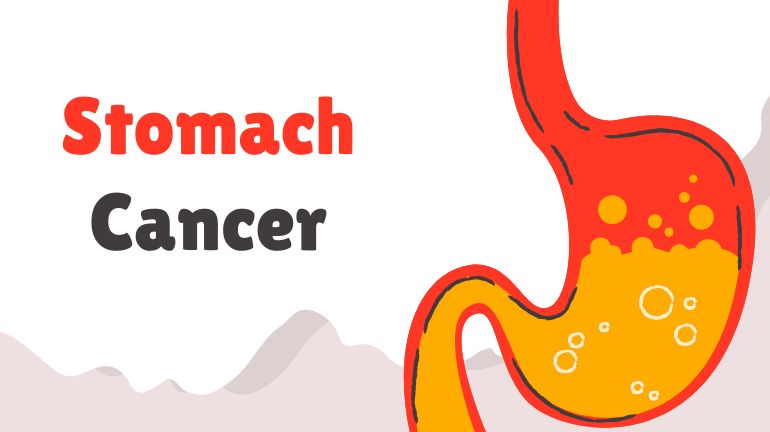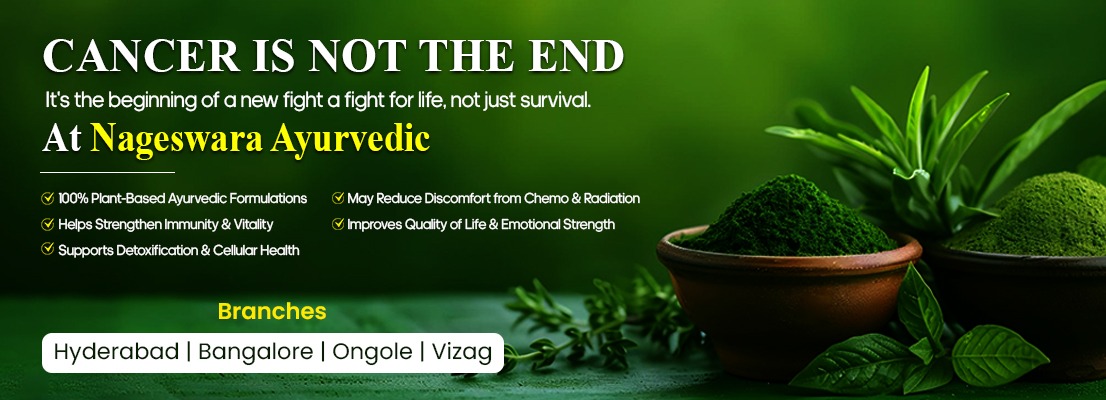
Stomach Cancer
Stomach cancer, or gastric carcinoma, is a malignant tumor arising from the inner lining (mucosa) of the stomach. It typically begins as precancerous changes due to chronic irritation, inflammation, or infection (notably Helicobacter pylori) and progresses over years. The most common type is adenocarcinoma, which can spread to nearby organs such as the liver, pancreas, and lymph nodes.
In Ayurveda, stomach cancer is correlated with Amlapitta leading to Annavaha Srotodushti and Amlapittaja Arbuda, a condition caused by Pitta aggravation, Agnimandya (weak digestive fire), and Ama accumulation, resulting in ulceration, inflammation, and tumor formation within the stomach wall.
Causes of Stomach Cancer
- Helicobacter pylori infection causing chronic gastritis.
- Consumption of smoked, spicy, and preserved foods (nitrosamines).
- Tobacco and alcohol use.
- Pernicious anemia or chronic gastritis.
- Genetic predisposition.
- Previous stomach surgery or ulcers.
Ayurvedic causes (Nidana):
- Irregular food timing and overeating.
- Excessively spicy, sour, and fried foods.
- Alcohol, stress, and suppression of hunger or belching.
- Agnimandya leading to Ama and Pitta accumulation in Annavaha Srotas.
Types of Stomach Cancer
- Adenocarcinoma: Most common, affects glandular cells of stomach lining.
- Lymphoma: Originates from immune cells in the stomach.
- Gastrointestinal Stromal Tumor (GIST): Arises from connective tissues.
- Carcinoid Tumor: Develops in hormone-producing cells.
Risk Factors
- Helicobacter pylori infection.
- Smoking, alcohol, and high-salt diet.
- Processed and pickled foods.
- Chronic gastritis or ulcers.
- Family history of gastric cancer.
- Kapha–Pitta dominant constitution.
- Poor digestive health and stress.
Signs & Symptoms
- Persistent indigestion, heartburn, or bloating.
- Abdominal pain or heaviness after meals.
- Loss of appetite or early satiety.
- Nausea, vomiting, or blood in vomit (hematemesis).
- Black or tarry stools.
- Unexplained weight loss, fatigue, and anemia.
- Feeling of lump or discomfort in the upper abdomen.
Complications
- Obstruction of stomach outlet (pylorus).
- Internal bleeding and severe anemia.
- Liver or peritoneal metastasis.
- Cachexia (severe weight and muscle loss).
- Malnutrition, dehydration, and post-treatment weakness.
Ayurveda’s Perspective on Stomach Cancer
In Ayurveda, Stomach Cancer is described as Amlapittaja Arbuda or Annavaha Srotodushti resulting from chronic Agnimandya (weak digestion) and Pitta-Kapha vitiation. Ama (metabolic toxins) formed due to incomplete digestion gets accumulated in the stomach, leading to inflammation, ulceration, and eventually abnormal tissue growth (Arbuda).
Nidana (Causative Factors):
- Irregular eating habits and improper food combinations (Viruddhahara).
- Excessive spicy, sour, and oily foods.
- Alcohol, stress, anger, and sleep deprivation.
- Poor digestion and chronic hyperacidity.
Samprapti (Pathogenesis):
- Agnimandya → Ama formation.
- Ama + Pitta–Kapha aggravation → Rakta & Mamsa dhatu dushti.
- Local inflammation in Annavaha Srotas → Granthi → Arbuda formation.
Dosha Role:
- Pitta: Causes heat, ulceration, bleeding, inflammation.
- Kapha: Promotes tumor growth, heaviness, stagnation.
- Vata: Causes pain, dryness, metastasis, and tissue degeneration.
Ayurvedic Management Principles:
- Shodhana (Detoxification): Eliminate Ama and balance doshas.
- Shamana (Pacification): Reduce inflammation, acidity, and pain.
- Rasayana (Rejuvenation): Strengthen digestion, enhance immunity, and restore Ojas.
Stomach Cancer Treatment at Nageswara Ayurvedic – Role of Draksharishta
At Nageswara Ayurvedic, the management of stomach cancer emphasizes digestive detoxification, Pitta–Kapha balance, and tissue rejuvenation through Draksharishta — a classical Rasayana fortified with plant-based minerals to restore digestion, metabolism, and strength.
Draksharishta (Core Formulation):
- Derived from Draksha (Vitis vinifera), rich in natural antioxidants, resveratrol, and polyphenols.
- Acts as a digestive Rasayana, supporting liver function, improving appetite, and reducing fatigue.
- Its mild fermentation base enhances bioavailability of minerals and herbal actives.
Plant-Based Mineral Fortification:
- Potassium (Moringa, Guava Leaf Extracts): Regulates electrolyte balance, prevents dehydration, and supports gastric mucosal healing.
- Sodium (Basil Extract): Maintains hydration, nerve signaling, and electrolyte stability.
- Magnesium (Moringa Leaf Extract): Reduces stress-related gastric inflammation and muscle spasms.
- Manganese (Bay Leaf Extract): Supports enzymatic detoxification and antioxidant defense.
- Iron (Curry Leaf Extract): Prevents anemia due to chronic bleeding and improves energy metabolism.
Together, these phytominerals provide safe, non-toxic, and bioavailable support for digestive restoration and mucosal protection, replacing traditional metal-based bhasmas with plant-based Rasayana equivalents.
Rasayana Herbs for Stomach Cancer Care
To enhance recovery, Nageswara Ayurvedic integrates Draksharishta with additional Rasayana herbs:
- Guduchi (Tinospora cordifolia): Detoxifier, immune booster, liver tonic.
- Haridra (Curcuma longa): Anti-inflammatory, anticancer, digestive stimulant.
- Amalaki (Phyllanthus emblica): Vitamin C-rich antioxidant that heals ulcers.
- Punarnava (Boerhavia diffusa): Improves digestion, reduces fluid retention.
- Shatavari (Asparagus racemosus): Soothes gastric mucosa, enhances tissue repair.
- Yashtimadhu (Glycyrrhiza glabra): Heals ulcers and relieves heartburn.
- Ashwagandha (Withania somnifera): Reduces fatigue, strengthens immunity.
These Rasayana herbs enhance digestion, regulate metabolism, and rebuild strength after chemotherapy or radiotherapy.
Treatment Relevance at Nageswara Ayurvedic
- 1. Shamana (Pacification):
- Internal use of Draksharishta with Haridra, Guduchi, and Amalaki to reduce inflammation and improve digestion.
- Soothing herbal decoctions for gastric mucosa healing.
- 2. Rasayana (Rejuvenation):
- Long-term therapy with Draksharishta fortified with plant-based Potassium, Sodium, Magnesium, Manganese, and Iron to rebuild gastric lining, support blood health, and improve vitality.
- 3. Diet & Lifestyle:
- Recommended: Easily digestible foods – rice gruel, soups, coconut water, steamed vegetables, turmeric, and aloe vera.
- Avoid: Spicy, fried, sour, pickled, and preserved foods; alcohol and caffeine.
- Lifestyle: Stress-free eating, regular sleep, yoga (Vajrasana, Pawanmuktasana), and Pranayama (Sheetali, Nadi Shodhana) for Pitta balance.
- 4. Integration with Modern Care:
- Ayurvedic therapy supports digestion, reduces nausea and acidity, and improves post-therapy appetite.
- Reduces oxidative stress and accelerates recovery after chemotherapy.
- Enhances energy, mood, and long-term resilience.
- 5. Holistic Outcome
- Tumor Regulation: Prevents progression through antioxidant protection.
- Detoxification: Clears Ama and Pitta-Kapha toxins.
- Gastroprotective: Heals ulcers and restores gastric mucosa.
- Metabolic Support: Improves appetite, digestion, and energy.
- Immunity Enhancement: Strengthens Ojas and recovery potential.
